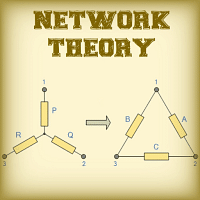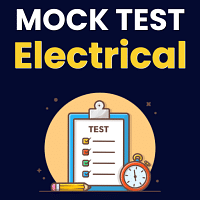Electrical Engineering (EE) Exam > Electrical Engineering (EE) Questions > As compared to capacitor -start inductionmoto...
Start Learning for Free
As compared to capacitor -start inductionmotors or split-phase motors, a permanent splitcapacitor motor has lower
- a)efficiency
- b)cost
- c)noise
- d)power-factor
Correct answer is option 'C'. Can you explain this answer?
| FREE This question is part of | Download PDF Attempt this Test |
Verified Answer
As compared to capacitor -start inductionmotors or split-phase motors,...
Another variation is the permanent-split capacitor (or PSC) motor. Also known as a capacitor-run motor, this type of motor uses a non-polarized capacitor with a high voltage rating to generate an electrical phase shift between the run and start windings.
View all questions of this test
Most Upvoted Answer
As compared to capacitor -start inductionmotors or split-phase motors,...
Introduction:
In the context of electric motors, there are different types of induction motors available, including capacitor-start induction motors, split-phase motors, and permanent split capacitor (PSC) motors. Each of these motors has its own characteristics and advantages. When comparing these motors, it is important to consider factors such as efficiency, cost, noise, and power factor.
Explanation:
1. Efficiency:
- Efficiency refers to the ability of a motor to convert electrical energy into mechanical energy.
- Permanent split capacitor (PSC) motors generally have lower efficiency compared to capacitor-start induction motors or split-phase motors.
- This is because PSC motors have a fixed capacitor that remains connected during the motor operation, resulting in a constant current flow through the auxiliary winding.
- This constant current flow creates additional losses and reduces the overall efficiency of the motor.
2. Cost:
- When it comes to cost, permanent split capacitor (PSC) motors are generally more cost-effective compared to capacitor-start induction motors.
- PSC motors have a simpler design and require fewer components, which helps in reducing the manufacturing cost.
- On the other hand, capacitor-start induction motors require additional components such as a starting capacitor and a centrifugal switch, which can increase the overall cost of the motor.
3. Noise:
- Permanent split capacitor (PSC) motors are known for their quiet operation.
- The fixed capacitor used in PSC motors helps in improving the motor's starting torque and reduces the noise generated during the motor operation.
- In contrast, capacitor-start induction motors or split-phase motors may produce more noise due to the use of additional components like a starting capacitor and a centrifugal switch.
4. Power Factor:
- Power factor is a measure of how effectively a motor utilizes the electrical power supplied to it.
- Permanent split capacitor (PSC) motors generally have a lower power factor compared to capacitor-start induction motors or split-phase motors.
- This is because the fixed capacitor in PSC motors creates a leading power factor, which results in a reactive power component in the motor's current waveform.
- On the other hand, capacitor-start induction motors or split-phase motors may have a better power factor due to the use of additional components that help in improving the power factor.
Conclusion:
In conclusion, a permanent split capacitor (PSC) motor has lower noise compared to capacitor-start induction motors or split-phase motors. However, it has lower efficiency and power factor compared to these motors. On the other hand, PSC motors are generally more cost-effective due to their simpler design. Therefore, the correct answer is option 'C' - noise.
In the context of electric motors, there are different types of induction motors available, including capacitor-start induction motors, split-phase motors, and permanent split capacitor (PSC) motors. Each of these motors has its own characteristics and advantages. When comparing these motors, it is important to consider factors such as efficiency, cost, noise, and power factor.
Explanation:
1. Efficiency:
- Efficiency refers to the ability of a motor to convert electrical energy into mechanical energy.
- Permanent split capacitor (PSC) motors generally have lower efficiency compared to capacitor-start induction motors or split-phase motors.
- This is because PSC motors have a fixed capacitor that remains connected during the motor operation, resulting in a constant current flow through the auxiliary winding.
- This constant current flow creates additional losses and reduces the overall efficiency of the motor.
2. Cost:
- When it comes to cost, permanent split capacitor (PSC) motors are generally more cost-effective compared to capacitor-start induction motors.
- PSC motors have a simpler design and require fewer components, which helps in reducing the manufacturing cost.
- On the other hand, capacitor-start induction motors require additional components such as a starting capacitor and a centrifugal switch, which can increase the overall cost of the motor.
3. Noise:
- Permanent split capacitor (PSC) motors are known for their quiet operation.
- The fixed capacitor used in PSC motors helps in improving the motor's starting torque and reduces the noise generated during the motor operation.
- In contrast, capacitor-start induction motors or split-phase motors may produce more noise due to the use of additional components like a starting capacitor and a centrifugal switch.
4. Power Factor:
- Power factor is a measure of how effectively a motor utilizes the electrical power supplied to it.
- Permanent split capacitor (PSC) motors generally have a lower power factor compared to capacitor-start induction motors or split-phase motors.
- This is because the fixed capacitor in PSC motors creates a leading power factor, which results in a reactive power component in the motor's current waveform.
- On the other hand, capacitor-start induction motors or split-phase motors may have a better power factor due to the use of additional components that help in improving the power factor.
Conclusion:
In conclusion, a permanent split capacitor (PSC) motor has lower noise compared to capacitor-start induction motors or split-phase motors. However, it has lower efficiency and power factor compared to these motors. On the other hand, PSC motors are generally more cost-effective due to their simpler design. Therefore, the correct answer is option 'C' - noise.
Attention Electrical Engineering (EE) Students!
To make sure you are not studying endlessly, EduRev has designed Electrical Engineering (EE) study material, with Structured Courses, Videos, & Test Series. Plus get personalized analysis, doubt solving and improvement plans to achieve a great score in Electrical Engineering (EE).

|
Explore Courses for Electrical Engineering (EE) exam
|

|
Similar Electrical Engineering (EE) Doubts
As compared to capacitor -start inductionmotors or split-phase motors, a permanent splitcapacitor motor has lowera)efficiencyb)costc)noised)power-factorCorrect answer is option 'C'. Can you explain this answer?
Question Description
As compared to capacitor -start inductionmotors or split-phase motors, a permanent splitcapacitor motor has lowera)efficiencyb)costc)noised)power-factorCorrect answer is option 'C'. Can you explain this answer? for Electrical Engineering (EE) 2024 is part of Electrical Engineering (EE) preparation. The Question and answers have been prepared according to the Electrical Engineering (EE) exam syllabus. Information about As compared to capacitor -start inductionmotors or split-phase motors, a permanent splitcapacitor motor has lowera)efficiencyb)costc)noised)power-factorCorrect answer is option 'C'. Can you explain this answer? covers all topics & solutions for Electrical Engineering (EE) 2024 Exam. Find important definitions, questions, meanings, examples, exercises and tests below for As compared to capacitor -start inductionmotors or split-phase motors, a permanent splitcapacitor motor has lowera)efficiencyb)costc)noised)power-factorCorrect answer is option 'C'. Can you explain this answer?.
As compared to capacitor -start inductionmotors or split-phase motors, a permanent splitcapacitor motor has lowera)efficiencyb)costc)noised)power-factorCorrect answer is option 'C'. Can you explain this answer? for Electrical Engineering (EE) 2024 is part of Electrical Engineering (EE) preparation. The Question and answers have been prepared according to the Electrical Engineering (EE) exam syllabus. Information about As compared to capacitor -start inductionmotors or split-phase motors, a permanent splitcapacitor motor has lowera)efficiencyb)costc)noised)power-factorCorrect answer is option 'C'. Can you explain this answer? covers all topics & solutions for Electrical Engineering (EE) 2024 Exam. Find important definitions, questions, meanings, examples, exercises and tests below for As compared to capacitor -start inductionmotors or split-phase motors, a permanent splitcapacitor motor has lowera)efficiencyb)costc)noised)power-factorCorrect answer is option 'C'. Can you explain this answer?.
Solutions for As compared to capacitor -start inductionmotors or split-phase motors, a permanent splitcapacitor motor has lowera)efficiencyb)costc)noised)power-factorCorrect answer is option 'C'. Can you explain this answer? in English & in Hindi are available as part of our courses for Electrical Engineering (EE).
Download more important topics, notes, lectures and mock test series for Electrical Engineering (EE) Exam by signing up for free.
Here you can find the meaning of As compared to capacitor -start inductionmotors or split-phase motors, a permanent splitcapacitor motor has lowera)efficiencyb)costc)noised)power-factorCorrect answer is option 'C'. Can you explain this answer? defined & explained in the simplest way possible. Besides giving the explanation of
As compared to capacitor -start inductionmotors or split-phase motors, a permanent splitcapacitor motor has lowera)efficiencyb)costc)noised)power-factorCorrect answer is option 'C'. Can you explain this answer?, a detailed solution for As compared to capacitor -start inductionmotors or split-phase motors, a permanent splitcapacitor motor has lowera)efficiencyb)costc)noised)power-factorCorrect answer is option 'C'. Can you explain this answer? has been provided alongside types of As compared to capacitor -start inductionmotors or split-phase motors, a permanent splitcapacitor motor has lowera)efficiencyb)costc)noised)power-factorCorrect answer is option 'C'. Can you explain this answer? theory, EduRev gives you an
ample number of questions to practice As compared to capacitor -start inductionmotors or split-phase motors, a permanent splitcapacitor motor has lowera)efficiencyb)costc)noised)power-factorCorrect answer is option 'C'. Can you explain this answer? tests, examples and also practice Electrical Engineering (EE) tests.

|
Explore Courses for Electrical Engineering (EE) exam
|

|
Suggested Free Tests
Signup for Free!
Signup to see your scores go up within 7 days! Learn & Practice with 1000+ FREE Notes, Videos & Tests.
























